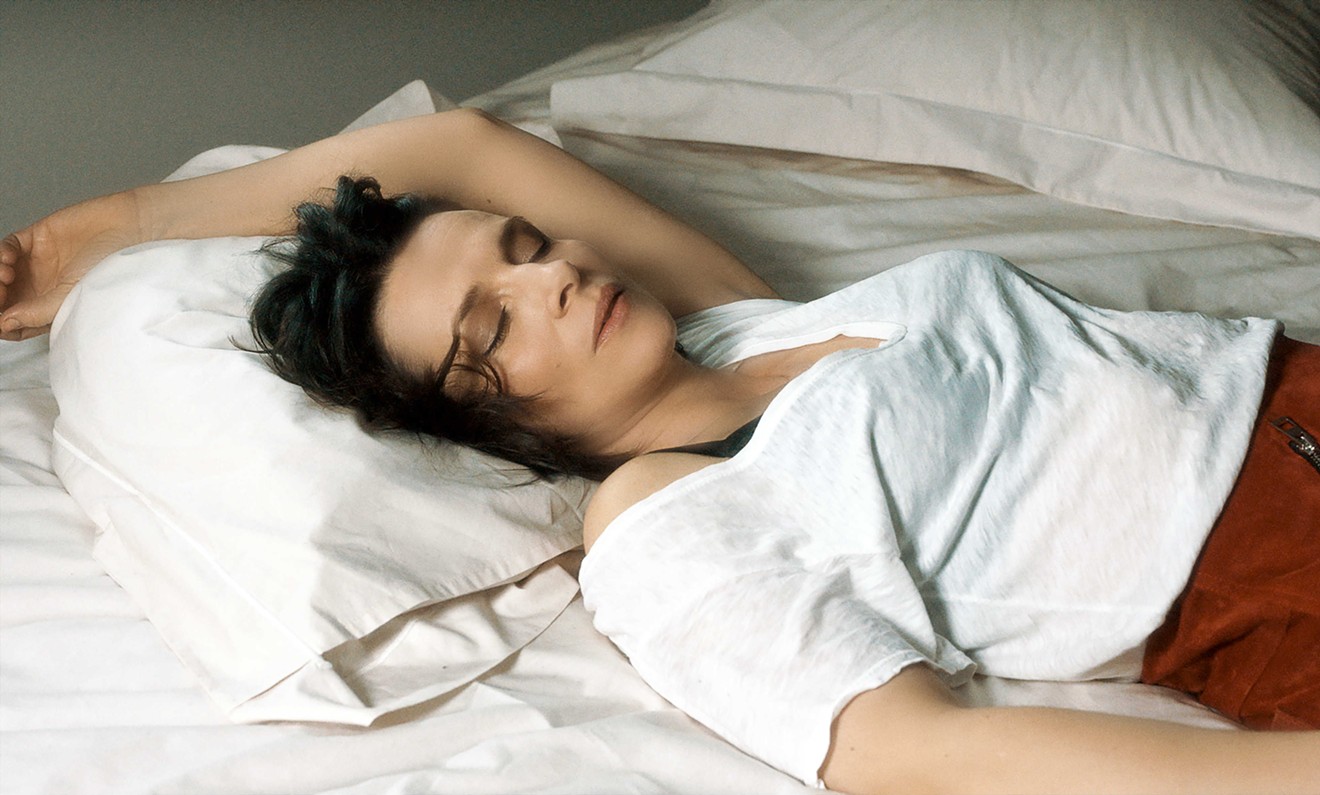Few directors can rival Claire Denis in the department of wordless seduction. From Valeria Bruni Tedeschi shooting nervous giggles at Vincent Gallo in a “God Only Knows”–filled bar (1996’s Nenette and Boni) to Mati Diop and Gregoire Colin swaying body-to-body to “Night Shift” (2008’s 35 Shots of Rum), Denis conveys the most primal of emotions through gestural action that she looks upon with an unfailing courage and generosity. (Her great cinematographer is Agnes Godard.)
During a remarkable sequence in her new Let the Sunshine In, Denis’s heroine, Isabelle (Juliette Binoche), upon falling into the arms of the sensitively brooding theater actor (Nicolas Duvauchelle) with whom she’s just had dinner, exhales from the depths of her being and admits: “It feels so good to stop all that talking.” Perhaps a momentary tongue-in-cheek nod to Deniss’ own exceptionally tactile, image-driven moviemaking, the line also functions as something of a rubric-in-miniature for the beguilingly elliptical rhythms of Let the Sunshine In.
Largely comical and also boundlessly compassionate and mature, this is essentially Denis’s movie about the dating game — the highs and lows, the setbacks and surprises, the wine-filled meals and sublimely silent car rides flush with the possibility of either consummation or heartbreak. Not for nothing does Sunshine open on a minutes-long scene of grunt-heavy lovemaking between Isabelle and a portly banker (Xavier Beauvois) and end with a fifteen-minute introspective dialogue between Isabelle and an apparent (and also quite portly) love psychic, played by Gerard Depardieu in a sterling, out-of-nowhere curveball cameo. Denis’s business here is nothing less than the exhaustive, seesawing, up-and-down swerves people experience when seeking out companionship — and the challenges, rewards and devastations that attend such a search. (Denis has described Roland Barthes’s A Lover’s Discourse: Fragments as a starting-point inspiration for Sunshine, with a screenplay she co-wrote with Christine Angot.)
Middle-aged, divorced and living seemingly comfortably as a painter in Paris, Isabelle orbits a half-dozen or so potential partners: Beauvois’s moneyed banker, who in a cocktail-lounge set piece snaps one-after-the-other specific requests at the bartender (gluten-free olives, hot water without lemon); Duvauchelle’s sullen actor, so practiced at ordering beers after “the nightly grind” of performance that he does so merely with a handsome wink; ex-husband Francois (Laurent Grevill), with whom Isabelle has a ten-year-old daughter, glimpsed once in the back seat of a car; kind-eyed art-world colleague Marc (the ravishing Denis regular Alex Descas); and Sylvain (Paul Blain), who sweeps Isabelle off her feet with his smooth dance-floor oscillations to Etta James singing “At Last.”
Denis’s extreme — but never forced — swings in momentum painstakingly approximate Isabelle’s headspace. At one point, Isabelle seeks out her girlfriend (Sandrine Dumas) in a restaurant bathroom to share, with great excitement, frank detail about the orgasms she’s enjoyed during sex with the banker. But then she bursts into tears and moans, “It’s like my love life is behind me!” Considering the extent of the ricocheting romantic adventures through which Denis puts Isabelle, Binoche’s on-a-dime despair here registers not as a transient flash of melodramatics, but a perfectly comprehensible state of mind. Isabelle’s adventures simply take her, on a constant basis, this way and that: A night that ends magically turns into a sobering day-after shot of her date announcing, “If we see each other again, can we not make love?” It’s in the sheer absence of screen time between the two states — the casual way Denis and her editor, Guy Lecorne, float between the peaks and valleys — that she is able to communicate her wise and wonderful ideas about human relationships. An existential whirlwind even when it seems sitcom-flippant, Sunshine sees Denis continuing on an elevated cinematic plane.
[
{
"name": "Air - MediumRectangle - Inline Content - Mobile Display Size",
"component": "12017618",
"insertPoint": "2",
"requiredCountToDisplay": "2"
},{
"name": "Editor Picks",
"component": "17242653",
"insertPoint": "4",
"requiredCountToDisplay": "1"
},{
"name": "Inline Links",
"component": "18838239",
"insertPoint": "8th",
"startingPoint": 8,
"requiredCountToDisplay": "7",
"maxInsertions": 25
},{
"name": "Air - MediumRectangle - Combo - Inline Content",
"component": "17261320",
"insertPoint": "8th",
"startingPoint": 8,
"requiredCountToDisplay": "7",
"maxInsertions": 25
},{
"name": "Inline Links",
"component": "18838239",
"insertPoint": "8th",
"startingPoint": 12,
"requiredCountToDisplay": "11",
"maxInsertions": 25
},{
"name": "Air - Leaderboard Tower - Combo - Inline Content",
"component": "17261321",
"insertPoint": "8th",
"startingPoint": 12,
"requiredCountToDisplay": "11",
"maxInsertions": 25
}
]











